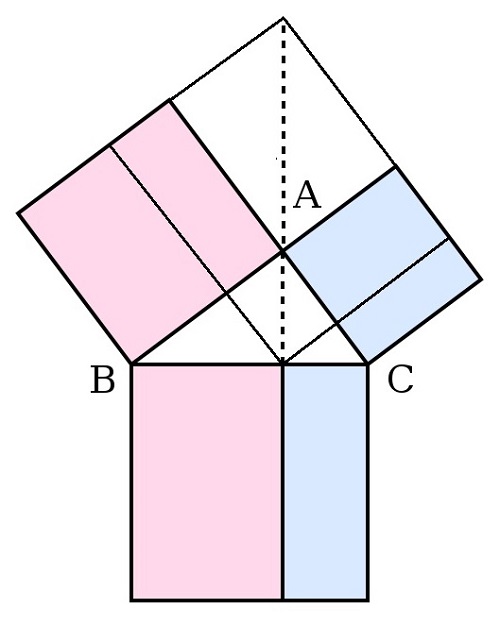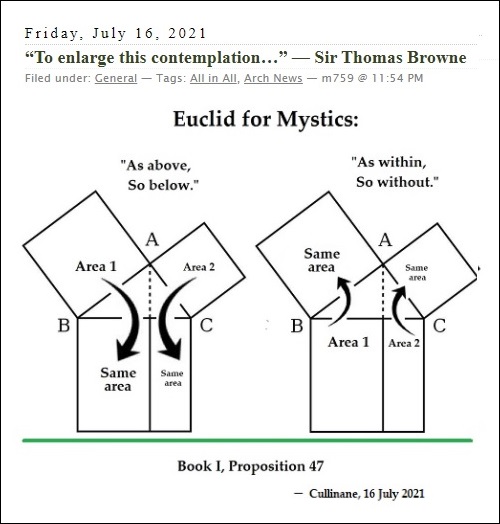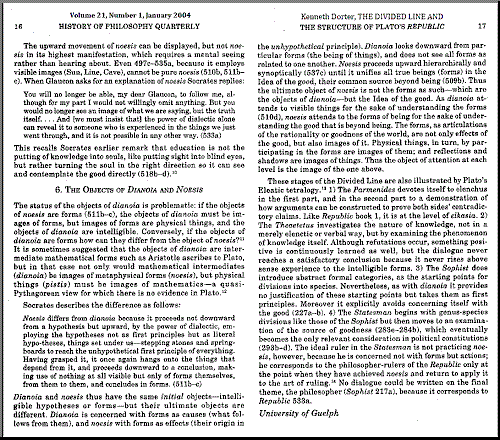See also, from the Ferencz date of death . . .
Friday, October 1, 2021
The Hunt for Brechtian October
Tuesday, September 14, 2021
Bullshit Studies: Plato vs. Peirce, or Cornerstone vs. Keystone
From a post of August 13, "The Divided Square" —
From a post of April 25, 2016, "Peirce's Accounts of the Universe" —

For the Peirce arrangement, see the imaginary film
reviewed in last night's post Packend! .
Packend!
Monday, September 13, 2021
Cube Space Revisited
The above Quanta article mentions
"Maryna Viazovska’s 2016 discovery of the most efficient
ways of packing spheres in dimensions eight and 24."
From a course to be taught by Viazovska next spring:
The Lovasz reference suggests a review of my own webpage
Cube Space, 1984-2003.
See as well a review of Log24 posts on Packing.
Tuesday, August 31, 2021
Annals of Geometry
A passage by Max Jammer quoted in yesterday's post
A Brief Introduction to Ideas suggests further remarks:
There are geometries in which lengths are not invariant
because they are not relevant — for instance, projective
geometry, finite geometry, and of course finite projective
geometry.
See the annus mirabilis introduction to that subject
cited by Jammer in yesterday's Brief Introduction —
Monday, August 30, 2021
A Brief Introduction to Ideas
Down, or: A Black Box for Didion


From "Why I Write," by Joan Didion —
|
"I am not a scholar. I am not in the least an intellectual, which is not to say that when I hear the word 'intellectual' I reach for my gun, but only to say that I do not think in abstracts. During the years when I was an undergraduate at Berkeley I tried, with a kind of hopeless late-adolescent energy, to buy some temporary visa into the world of ideas, to forge for myself a mind that could deal with the abstract. All I knew then was what I wasn’t, and it took me some years to discover what I was. In short I tried to think. I failed. My attention veered inexorably back to the specific, to the tangible, to what was generally considered, by everyone I knew then and for that matter have known since, the peripheral. I would try to contemplate the Hegelian dialectic and would find myself concentrating instead on a flowering pear tree outside my window and the particular way the petals fell on my floor. I would try to read linguistic theory and would find myself wondering instead if the lights were on in the Bevatron up the hill. When I say that I was wondering if the lights were on in the Bevatron you might immediately suspect, if you deal in ideas at all, that I was registering the Bevatron as a political symbol, thinking in shorthand about the military-industrial complex and its role in the university community, but you would be wrong. I was only wondering if the lights were on in the Bevatron, and how they looked. A physical fact. I had trouble graduating from Berkeley, not because of this inability to deal with ideas—I was majoring in English, and I could locate the house-and-garden imagery in The Portrait of a Lady as well as the next person, 'imagery' being by definition the kind of specific that got my attention—but simply because I had neglected to take a course in Milton. For reasons which now sound baroque I needed a degree by the end of that summer, and the English department finally agreed, if I would come down from Sacramento every Friday and talk about the cosmology of Paradise Lost , to certify me proficient in Milton. I did this. Some Fridays I took the Greyhound bus, other Fridays I caught the Southern Pacific’s City of San Francisco on the last leg of its transcontinental trip. I can no longer tell you whether Milton put the sun or the earth at the center of his universe in Paradise Lost , the central question of at least one century and a topic about which I wrote ten thousand words that summer, but I can still recall the exact rancidity of the butter in the City of San Francisco’s dining car, and the way the tinted windows on the Greyhound bus cast the oil refineries around Carquinez Strait into a grayed and obscurely sinister light. In short my attention was always on the periphery, on what I could see and taste and touch, on the butter, and the Greyhound bus. During those years I was traveling on what I knew to be a very shaky passport, forged papers: I knew that I was no legitimate resident in any world of ideas. I knew I couldn’t think. All I knew then was what I couldn’t do. All I knew then was what I wasn’t, and it took me some years to discover what I was." |
"I knew that I was no legitimate resident in any world of ideas."
— Joan Didion, December 5, 1976
"In the 1988 interview with Scripps Howard, Mr. Poynter mused
about the device he wanted to invent for his own tombstone.
'When you walked up to it,' he said, 'you’d activate
an electronic voice. And it would say, "Come on down."’”
— New York Times obituary yesterday
And add, "We all float down here"?
For other, better, remarks about ideas by Didion
see "Freeze the shifting phantasmagoria," a phrase
from her 1979 book The White Album.
Saturday, August 28, 2021
Scenes from… The Seventh Sausage
Sunday, August 15, 2021
Simple Similarity
The following image (click to enlarge) is now the target of
a link on the phrase "similarly divided" in Friday's post
"The Divided Square."
Related material —
A version of the above Schroeder pages, dumbed down for
readers of The New Yorker —
Note that the proof under discussion has nothing to do with
the New Yorker 's rubric "Annals of Technology."
Note also the statement by Strogatz that
"Einstein’s proof reveals why the Pythagorean theorem
applies only to right triangles: they’re the only kind
made up of smaller copies of themselves."
Exercise: Discuss the truth or falsity of the Strogatz statement
after reviewing the webpage Triangles Are Square.
For approaches to geometry that are more advanced, see
this journal on the above New Yorker date — Nov. 19, 2015 —
Highlights of the Dirac-Mathieu Connection.
Friday, August 13, 2021
The Divided Square
Compare and contrast —
Update of 2:25 PM ET on Friday, August 13th, 2021 —
Plato's alleged motto, "Let no one ignorant of geometry enter,"
seems to have been of little use to those attempting to make sense
of his "divided line" analogy in the Republic.
Some related geometry —
The Divided Square :
Three Similarly Divided Squares :


Scholium —
Thursday, August 12, 2021
Unsocratic Method
"One, two, three . . . but where is the fourth?" — Socrates
Update of 4:40 AM ET the next morning —

For students of metaphor —
"four major pillars
of the reality-based community" —
Update at 6:32 AM ET Friday the 13th — Cross-examination —
Saturday, March 16, 2019
Grundlagen
See also eightfold cube.
Monday, April 25, 2016
Peirce’s Accounts of the Universe

Compare and contrast Peirce's seven systems of metaphysics with
the seven projective points in a post of March 1, 2010 —

From my commentary on Carter's question —






















